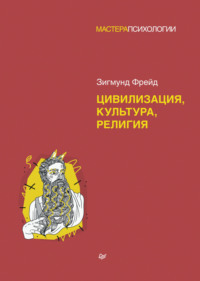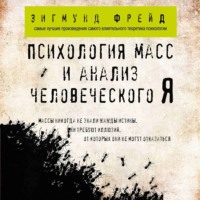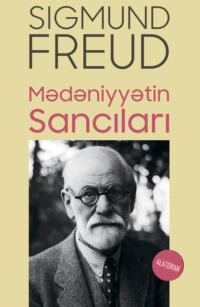 полная версия
полная версияDelusion and Dream : an Interpretation in the Light of Psychoanalysis of Gradiva
When, in the morning, the sun, with lively assistance from the flies, awoke him, he could not recall what, besides strange, Ovid-like metamorphoses, had occurred during the night about his bed. Yet doubtless some mystic being, continuously weaving dream-webs, had been sitting beside him, for he felt his head completely overhung and filled with them, so that all ability to think lay inextricably imprisoned in it and only one thing remained in his consciousness; he must again be in Meleager’s house at exactly noon. In this connection, however, a fear overcame him, for if the gatekeepers at the “ingresso” looked at him, they would not let him in. Anyway it was not advisable that he should expose himself to close observation by human eyes. To escape that, there was, for one well informed about Pompeii, a means which was, to be sure, against the rules, but he was not in a condition to grant to legal regulation a determination of his conduct. So he climbed again, as on the evening of his arrival, along the old city-wall, and upon it walked, in a wide semicircle, around the city of ruins to the solitary, unguarded Porta di Nola. Here it was not difficult to get down into the inside and he went, without burdening his conscience very much over the fact that by his autocratic deed he had deprived the administration of a two-lira entrance fee, which he could, of course, let it have later in some other way.
Thus, unseen, he had reached an uninteresting part of the city, never before investigated by any one and still mostly unexcavated; he sat down in a secluded, shady nook and waited, now and then drawing his watch to observe the progress of time. Once his glance fell upon something in the distance gleaming, silvery-white, rising from the ashes, but with his unreliable vision, he was unable to distinguish what it was. Yet involuntarily he was impelled to go up to it and there it stood, a tall, flowering asphodel-plant with white, bell-like blossoms whose seeds the wind had carried thither from outside. It was the flower of the lower world, significant and, as he felt, destined to grow here for his purpose. He broke the slender stem and returned with it to his seat. Hotter and hotter the May sun burned down as on the day before, and finally approached its noonday position; so now he started out through the long Strada di Nola. This lay deathly still and deserted, as did almost all the others; over there to the west all the morning visitors were already crowding again to the Porta Marina and the soup-plates. Only the air, suffused with heat, stirred, and in the dazzling glare the solitary figure of Norbert Hanold with the asphodel branch appeared like that of Hermes, Psyche’s escort, in modern attire, starting out upon the journey to conduct a departed soul to Hades.
Not consciously, yet following an instinctive impulse, he found his way through the Strada della Fortuna farther along to the Strada di Mercurio, and turning to the right arrived at the Casa di Meleagro. Just as lifelessly as yesterday, the vestibule, inner court and peristyle received him, and between the pillars of the latter the poppies of the dining-room flamed across to him. As he entered, however, it was not clear to him whether he had been here yesterday or two thousand years ago to seek from the owner of the house some information of great importance to archæology; what it was, however, he could not state, and besides, it seemed to him, even though in contradiction to the above, that all the science of antiquity was the most purposeless and indifferent thing in the world. He could not understand how a human being could occupy himself with it, for there was only a single thing to which all thinking and investigation must be directed: what is the nature of the physical manifestation of a being like Gradiva, dead and alive at the same time, although the latter was true only in the noon hour of spirits – or had been the day before, perhaps the one time in a century or a thousand years, for it suddenly seemed certain that his return to-day was in vain. He did not meet the girl he was looking for, because she was not allowed to come again until a time when he too would have been dead for many years, and was buried and forgotten. Of course, as he walked now along by the wall below Paris awarding the apple, he perceived Gradiva before him, just as on yesterday, in the same gown, sitting between the same two yellow pillars on the same step. Yet he did not allow himself to be deceived by tricks of imagination, but knew that fancy alone was deceptively depicting before his eyes what he had really seen there the day before. He could not refrain, however, from stopping to indulge in the view of the shadowy apparition created by himself and, without his knowing it, there passed from his lips in a grieved tone the words, “Oh, that you were still alive!”
His voice rang out, but, after that, breathless silence again reigned among the ruins of the old dining-room. Yet soon another sounded through the vacant stillness, saying, “Won’t you sit down too? You look exhausted.”
Norbert Hanold’s heart stood still a moment. His head, however, collected this much reason; a vision could not speak; or was an aural hallucination practising deception upon him? With fixed gaze, he supported himself against the pillar.
Then again asked the voice, and it was the one which none other than Gradiva possessed, “Are you bringing me the white flowers?”
Dizziness rushed upon him; he felt that his feet no longer supported him, but forced him to be seated; and he slid down opposite her on the step, against the pillar. Her bright eyes were directed toward his face, yet with a different look from the one with which she had gazed at him yesterday when she suddenly rose and went away. In that, something ill-humoured and repellent had spoken; but it had disappeared, as if she had, in the meanwhile, arrived at a different view-point, and an expression of searching inquisitiveness or curiosity had taken its place. Likewise, she spoke with an easy familiarity. As he remained silent, however, to the last question also, she again resumed, “You told me yesterday that you had once called to me when I lay down to sleep and that you had afterwards stood near me; my face was as white as marble. When and where was that? I cannot remember it, and I beg you to explain more exactly.”
Norbert had now acquired enough power of speech to answer, “In the night when you sat on the steps of the Temple of Apollo in the Forum and the fall of ashes from Vesuvius covered you.”
“So – then. Yes, to be sure – that had not occurred to me, but I might have thought that it would be a case like that. When you said it yesterday, I was not expecting it, and I was utterly unprepared. Yet that happened, if I recall correctly, two thousand years ago. Were you living then? It seems to me you look younger.” She spoke very seriously, but at the end a faint, extremely sweet smile played about her mouth. He hesitated in embarrassment and answered, stuttering slightly, “No, I really don’t believe I was alive in the year 79 – it was perhaps – yes, it surely is a psychic condition which is called a dream that transported me into the time of the destruction of Pompeii – but I recognized you again at first glance.”
In the expression of the girl sitting opposite him, a few feet away, surprise was apparent, and she repeated in a tone of amazement, “You recognized me again? In the dream? By what?”
“At the very first; by your manner of walking.”
“Had you noticed that? And have I a special manner of walking?”
Her astonishment had grown perceptibly. He replied, “Yes – don’t you realize that? A more graceful one – at least among those now living – does not exist. Yet I recognized you immediately by everything else too, your figure, face, bearing and drapery, for everything agreed most minutely with the bas-relief of you in Rome.”
“Ah, really – ” she repeated in her former tone – “with the bas-relief of me in Rome. Yes, I hadn’t thought of that either, and at this moment I don’t know exactly – what is it – and you saw it there then?”
Now he told her that the sight of it had attracted him so that he had been highly pleased to get a plaster-cast of it in Germany, and that for years it had hung in his room. He observed it daily, and the idea had come to him that it must represent a young Pompeiian girl who was walking on the stepping-stones of a street in her native city; and the dream had confirmed it. Now he knew also that he had been impelled by it to travel here again to see whether he could find some trace of her; and as he had stood yesterday noon at the corner of Strada di Mercurio, she, herself, exactly like her image, had suddenly walked before him across the stepping-stones, as if she were about to go over into the house of Apollo. Then farther along she had recrossed the street and disappeared before the house of Meleager.
To this she nodded and said, “Yes, I intended to look up the house of Apollo, but I came here.”
He continued, “On that account the Greek poet, Meleager, came to my mind, and I thought that you were one of his descendants and were returning – in the hour which you are allowed – to your ancestral home. When I spoke to you in Greek, however, you did not understand.”
“Was that Greek? No, I don’t understand it or I’ve probably forgotten it. Yet as you came again just now, I heard you say something that I could understand. You expressed the wish that some one might still be alive here. Only I did not understand whom you meant by that.”
That caused him to reply that, at sight of her, he had believed that it was not really she, but that his imagination was deceptively putting her image before him in the place where he had met her yesterday. At that she smiled and agreed, “It seems that you have reason to be on your guard against an excess of imagination, although, when I have been with you, I never supposed so.” She stopped, however, and added, “What is there peculiar about my way of walking, which you spoke of before?”
It was noteworthy that her aroused interest brought her back to that, and he said, “If I may ask – ”
With that he stopped, for he suddenly remembered with fear that yesterday she had suddenly risen and gone away when he had asked her to lie down to sleep again on that step, as on that of the Temple of Apollo, and, associated darkly with this, there came to him the glance which she had directed upon him in departing. Yet now the calm, friendly expression of her eyes remained, and as he spoke no further, she said, “It was nice that your wish that some one might still be alive concerned me. If you wish to ask anything of me on that account, I will gladly respond.”
That overcame his fear, and he replied, “It would make me happy to get a close view of you walking as you do in the bas-relief.”
Willingly, without answering, she stood up and walked along between the wall and the pillars. It was the very buoyantly reposeful gait, with the sole raised almost perpendicularly, that was so firmly imprinted on his mind, but for the first time he saw that she wore, below the raised gown, not sandals, but light, sand-coloured shoes of fine leather. When she came back and sat down again silently, he involuntarily started to talk of the difference in her foot-covering from that of the bas-relief. To that she rejoined, “Time, of course, always changes everything, and for the present sandals are not suitable, so I put on shoes, which are a better protection against rain and dust; but why did you ask me to walk before you? What is there peculiar about it?”
Her repeated wish to learn this proved her not entirely free from feminine curiosity. He now explained that it was a matter of the peculiarly upright position of the rising foot, as she walked, and he added how for weeks he had tried to observe the gait of modern women on the streets in his native city. Yet it seemed that this beautiful way of walking had been completely lost to them, with the exception, perhaps, of a single one who had given him the impression that she walked in that way. To be sure, he had not been able to establish this fact because of the crowd about her, and he had probably experienced an illusion, for it had seemed to him that her features had resembled somewhat those of Gradiva.
“What a shame,” she answered. “For confirmation of the fact would surely have been of great scientific importance, and if you had succeeded, perhaps you would not have needed to take the long journey here; but whom were you just speaking of? Who is Gradiva?”
“I have named the bas-relief that, because I didn’t know your real name, and don’t know it yet, either.”
This last he added with some hesitancy, and she faltered a moment before replying to the indirect question. “My name is Zoë.”
With pained tone the words escaped him: “The name suits you beautifully, but it sounds to me like bitter mockery, for ‘Zoë’ means ‘life.’”
“One must adapt himself to the inevitable,” she responded, “and I have long accustomed myself to being dead; but now my time is over for to-day; you have brought the grave-flower with you to conduct me back. So give it to me.”
As she rose and stretched forth her slender hand, he gave her the asphodel cluster, but was careful not to touch her fingers. Accepting the flowering branch she said, “I thank you. To those who are more fortunate one gives roses in spring, but for me the flower of oblivion is the right one from your hand. To-morrow I shall be allowed to come here again at this hour. If your way leads you again into the house of Meleager, we can sit together at the edge of the poppies, as we did to-day. On the threshold stands ‘Ave,’ and I say it to you ‘Ave’!”
She went out and disappeared, as yesterday, at the turn in the portico, as if she had there sunk into the ground. Everything lay empty and silent again, but, from some distance, there once rang, short and clear, a sound like the merry note of a bird flying over the devastated city. This was stifled immediately, however. Norbert, who had remained behind, looked down at the step where she had just been sitting; there something white shimmered; it seemed to be the papyrus leaf which Gradiva had held on her knees yesterday and had forgotten to take with her to-day. Yet, as he shyly reached for it, he found it to be a little sketch-book with pencil drawings of the different ruins in several houses of Pompeii. The page next to the last showed a drawing of the griffin-table in the central court of the Casa di Meleagro, and on the last was the beginning of a reproduction of the view across the poppies of the dining-room through the row of pillars of the peristyle. That the departed girl made drawings in a sketch-book of the present mode was as amazing as had been the fact that she expressed her thoughts in German. Yet those were only insignificant prodigies beside the great one of her revivification, and apparently she used the midday hour of freedom to preserve for herself, in their present state, with unusual artistic talent, the surroundings in which she had once lived. The drawings testified to delicately cultivated powers of perception, as each of her words did to a clever intellect; and she had probably often sat by the old griffin-table, so that it was a particularly precious reminder.
Mechanically Norbert also went, with the little book, along the portico, and at the place where this turned he noticed in the wall a narrow cleft wide enough to afford, to an unusually slender figure, passage into the adjoining building, and even farther to the Vicolo del Fauno at the other side of the house. Suddenly, however, the idea flashed through his mind that Zoë-Gradiva did not sink into the ground here – that was essentially unreasonable, and he could not understand how he had ever believed it – but went, on this street, back to her tomb. That must be in the Street of Tombs, and rushing forth, he hastened out into the Strada di Mercurio and as far as the gate of Hercules; but when, breathless and reeking with perspiration, he entered this, it was already too late. The broad Strada di Sepolcri stretched out empty and dazzlingly white, only at its extremity, behind the glimmering curtain of radiance, a faint shadow seemed to dissolve uncertainly before the Villa of Diomede.
Norbert Hanold passed the second half of the day with a feeling that Pompeii was everywhere, or at least wherever he stopped, veiled in a cloud of mist. It was not grey, gloomy and melancholy as formerly, but rather cheerful and vari-coloured to an extraordinary degree; blue, red and brown, chiefly a light-yellowish white and alabaster white, interwoven with golden threads of sunbeams. This injured neither his power of vision nor that of hearing, only, because of it, thinking was impossible, and that produced a cloud-wall whose effect rivalled the thickest mist. To the young archæologist it seemed almost as if hourly, in an invisible and not otherwise noticeable way, there was brought to him a little bottle of Vesuvio wine, which produced a continuous whirling in his head. From this he instinctively sought to free himself by the use of correctives, on the one hand drinking water frequently, and on the other hand moving about as much and as far as possible. His knowledge of medicine was not comprehensive, but it helped him to the diagnosis that this strange condition must arise from excessive congestion of blood in his head, perhaps associated with accelerated action of the heart; for he felt the latter – something formerly quite unknown to him – occasionally beating fast against his chest. Otherwise, his thoughts, which could not penetrate into the outer world, were not in the least inactive within, or more exactly, there was only one thought there, which had come into sole possession and carried on a restless, though vain activity. It continually turned about the question of what physical nature Zoë-Gradiva might possess, whether during her stay in the house of Meleager she was a corporeal being or only an illusory representation of what she had formerly been. For the former, physical, physiological and anatomical facts seemed to argue that she had at her disposal organs of speech, and could hold a pencil with her fingers. Yet Norbert was overwhelmed with the idea that if he should touch her, even lightly place his hand on hers, he would then encounter only empty air. A peculiar impulse urged him to make sure of this, but an equally great timidity hindered him from even thinking of doing it. For he felt that the confirmation of either of the two possibilities must bring with it something inspiring fear. The corporeal existence of the hand would thrill him with horror, and its lack of substance would cause him deep pain.
Occupied vainly with this problem, which was impossible to solve scientifically without experiment, he arrived, in the course of his extensive wanderings that afternoon, at the foothills of the big mountain group of Monte Sant’ Angelo, rising south from Pompeii, and here he unexpectedly came upon an elderly man, already grey-bearded, who, from his equipment with all sorts of implements, seemed to be a zoologist or botanist, and appeared to be making a search on a hot, sunny slope. He turned his head as Norbert came close to him, looked at the latter in surprise for a moment and then said, “Are you interested in Faraglionensis? I should hardly have supposed it, but it seems thoroughly probable that they are found, not only in the Faraglioni of Capri, but also dwell permanently on the mainland. The method suggested by my colleague, Eimer, is really good; I have already used it often with the best of success. Please remain quite still – ”
The speaker stopped, stepped carefully forward a few paces and, stretched out motionless on the ground, held a little snare, made of a long grass-blade, before a narrow crevice in the rock, from which the blue, chatoyant little head of a lizard peeped. Thus the man remained without the slightest movement, and Norbert Hanold turned about noiselessly behind him and returned by the way he had come. It seemed to him dimly that he had already seen the face of the lizard-hunter once, probably in one of the two hotels; to this fact the latter’s manner pointed. It was hardly credible what foolishly remarkable purposes could cause people to make the long trip to Pompeii; happy that he had succeeded in so quickly ridding himself of the snare-layer, and being again able to direct his thoughts to the problem of corporeal reality or unreality, he started on the return. Yet a side street misled him once to a wrong turn and took him, instead of to the west boundary, to the east end of the extensive old city-wall; buried in thought, he did not notice the mistake until he had come right up to a building which was neither the “Diomed” nor the “Hotel Suisse.” In spite of this it bore the sign of an hotel; near by he recognized the ruins of the large Pompeiian amphitheatre, and the memory came to him that near this latter there was another hotel, the “Albergo del Sole,” which, on account of its remoteness from the station, was sought out by only a few guests, and had remained unknown to even him. The walk had made him hot; besides, the cloudy whirling in his head had not diminished; so he stepped in through the open door and ordered the remedy deemed useful by him for blood congestion, a bottle of lime-water. The room stood empty except, of course, for the fly-visitors gathered in full numbers, and the unoccupied host availed himself of the opportunity to recommend highly his house and the excavated treasures it contained. He pointed suggestively to the fact that there were, near Pompeii, people at whose places there was not a single genuine piece among the many objects offered for sale, but that all were imitations, while he, satisfying himself with a smaller number, offered his guests only things undoubtedly genuine. For he acquired no articles which he himself had not seen brought to the light of day, and, in the course of his eloquence, he revealed that he had also been present when they had found near the Forum the young lovers who had clasped each other in firm embrace when they realized their inevitable destruction, and had thus awaited death. Norbert had already heard of this discovery, but had shrugged his shoulders about it as a fabulous invention of some especially imaginative narrator, and he did so now, too, when the host brought in to him, as authentic proof, a metal brooch encrusted with green patina, which, in his presence, had been gathered with the remains of the girl from the ashes. When the arrival at the “Sun Hotel” took it in his own hand, however, the power of imagination exercised such ascendency over him that suddenly, without further critical consideration, he paid for it the price asked from English people, and, with his acquisition, hastily left the “Albergo del Sole,” in which, after another turn, he saw in an open window, nodding down, an asphodel branch covered with white blossoms, which had been placed in a water-glass; and without needing any logical connection, it rushed through his mind, at the sight of the grave-flower, that it was an attestation of the genuineness of his new possession.
This he viewed with mingled feelings of excitement and shyness, keeping now to the way along the city-wall to Porta Marina. Then it was no fairy tale that a couple of young lovers had been excavated near the Forum in such an embrace, and there at the Apollo temple he had seen Gradiva lie down to sleep, but only in a dream; that he knew now quite definitely; in reality she might have gone on still farther from the Forum, met some one and died with him.
From the green brooch between his fingers a feeling passed through him that it had belonged to Zoë-Gradiva, and had held her dress closed at the throat. Then she was the beloved fiancée, perhaps the young wife of him with whom she had wished to die.
It occurred to Norbert Hanold to hurl the brooch away. It burned his fingers as if it had become glowing, or more exactly, it caused him the pain such as he had felt at the idea that he might put his hand on that of Gradiva and encounter only empty air.
Reason, nevertheless, asserted the upper hand; he did not allow himself to be controlled by imagination against his will. However probable it might be, there was still lacking invincible proof that the brooch had belonged to her and that it had been she who had been discovered in the young man’s arms. This judgment made it possible for him to breathe freely, and when at the dawn of twilight he reached the “Diomed,” his long wandering had brought to his sound constitution need of physical refreshment. Not without appetite did he devour the rather Spartan evening meal which the “Diomed,” in spite of its Argive origin, had adopted, and he then noticed two guests newly-arrived in the course of the afternoon. By appearance and language they marked themselves as Germans, a man and a woman; they both had youthful, attractive features endowed with intellectual expressions; their relation to each other could not be determined, yet, because of a certain resemblance, Norbert decided that they were brother and sister. To be sure the young man’s fair hair differed in colour from her light-brown tresses. In her gown she wore a red Sorrento rose, the sight of which, as he looked across from his corner, stirred something in his memory without his being able to think what it was. The couple were the first people he had met on his journey who seemed possibly congenial. They talked with one another, over a little bottle, in not too plainly audible tones, nor in cautious whisperings, apparently sometimes about serious things and sometimes about gay things, for at times there passed over her face a half-laughing expression which was very becoming to her, and aroused the desire to participate in their conversation, or perhaps might have awakened it in Norbert, if he had met them two days before in the room otherwise populated only by Anglo-Americans. Yet he felt that what was passing through his mind stood in too strong contrast to the happy naïveté of the couple about whom there undeniably lay not the slightest cloud, for they doubtless were not meditating profoundly over the essential nature of a girl who had died two thousand years ago, but, without any weariness, were taking pleasure in an enigmatical problem of their life of the present. His condition did not harmonize with that; on the one hand he seemed superfluous to them, and on the other, he recoiled from an attempt to start an acquaintance with them, for he had a dark feeling that their bright, merry eyes might look through his forehead into his thoughts and thereby assume an expression as if they did not consider him quite in his right mind. Therefore he went up to his room, stood, as yesterday, at the window, looking over to the purple night-mantle of Vesuvius, and then he lay down to rest. Exhausted, he soon fell asleep and dreamed, but remarkably nonsensically. Somewhere in the sun Gradiva sat making a trap out of a blade of grass in order to catch a lizard, and she said, “Please stay quite still – my colleague is right; the method is really good, and she has used it with the greatest success.”









